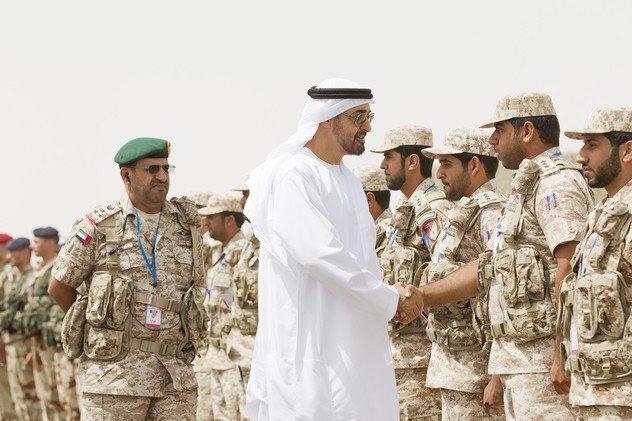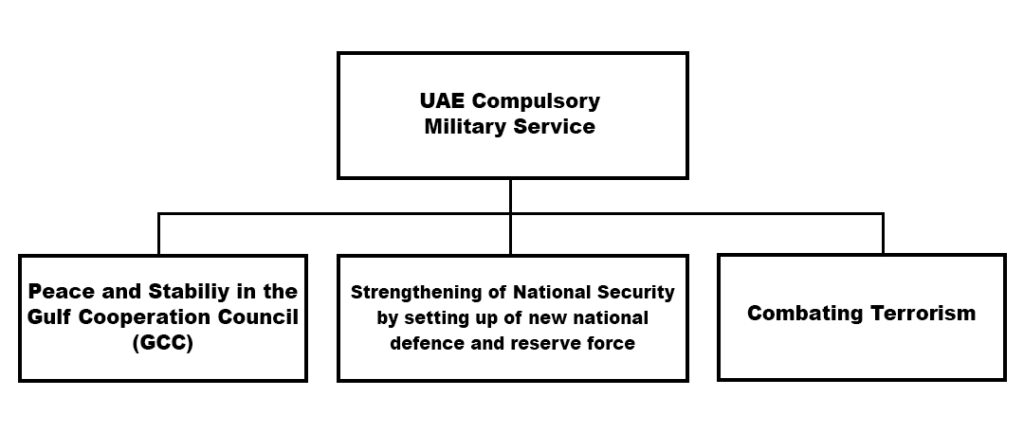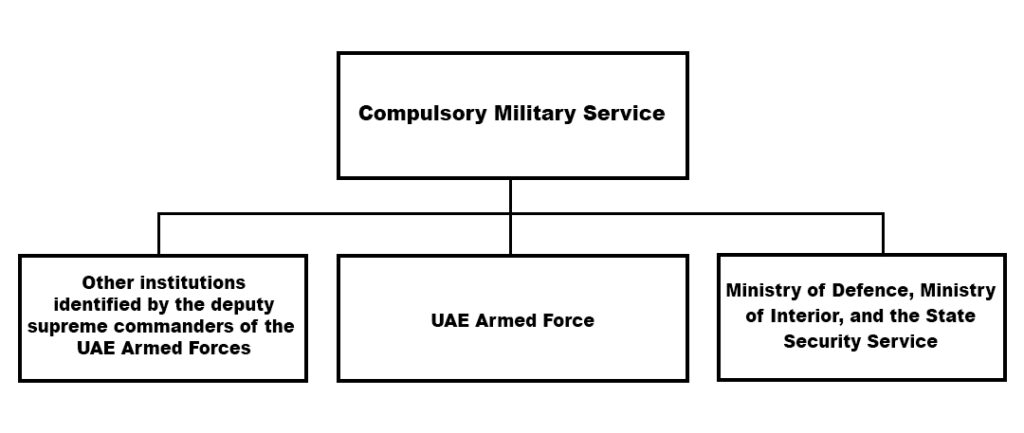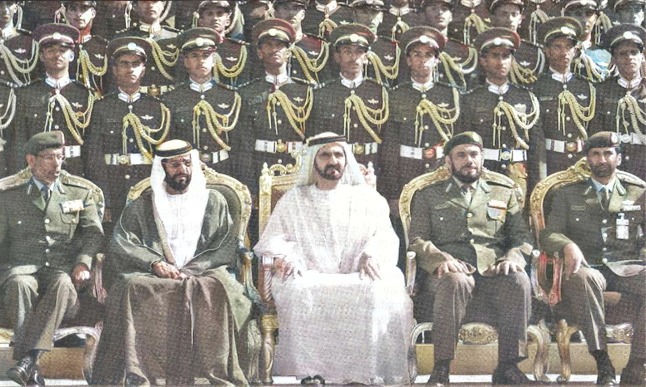“The new law adds another layer to the national defense force to further protect our nation, secure its borders (and) preserve its achievements.”- His Highness Sheik Mohammed bin Rashid Al Maktoum, Vice-President and Prime Minister of the UAE and Ruler of Dubai
His Highness Shaikh Khalifa Bin Zayed Al Nahyan, President of United Arab Emirates (UAE) recently promulgated a law relating to Compulsory Military Service (CMS) for all Emiratis aged between 18 and 30 and setting up a new national defence and reserve force. The issuing of the law comes with the goals of affirming the instilling of the values of loyalty, affiliation and sacrifice in the souls of the sons of homeland.
As wars continuously happened almost around the world, the Military Service System (MSS) came into being and different recruiting systems were formed including the CMS throughout the world. Military Recruiting Systems (MRS) refers to institutional arrangements which are used to absorb certain quantity, quality and structure of the military manpower to meet the needs of the nation’s defense. Basically there are two models: compulsory military service (conscription) and all volunteer force (or mercenary). Some countries have combined these two models which was known as ‘hybrid military service system’.
Utility of CMS
CMS teaches male citizens to be more responsible for themselves and to their families and promotes healthy competition in the society. Citizens would become stronger not only physically but mentally as well and it has far-reaching effects on the society and system. Non-monetary benefits stand for the psychological benefits and the loss-of-time value. Army Service (AS) benefits include immediate service benefits and the expected return. Immediate monetary benefits include salaries, benefits, family preference, retirement benefits and so on. For non-monetary benefits, the military service not only obtains material benefits, but also receives psychological and spiritual benefits, which constitutes an individual’s utility function together.
Total defense has many branches. They are psychological defense, social defense, economic defense, civil defense and military defense. Putting people from different cultures in the forces together will help counter prejudice and racism. It always institutionalizes nationhood.
The establishment of the CMS is different in other countries. In some countries, they require military service or call conscriptions. In this field, there are some countries that require it such as, Brazil, Germany, Israel, Switzerland, South Korea, Mexico, and Russia. However, in other countries they just have volunteers to join in armies including Australia, Canada, Japan, the United Kingdom, and the United States. In both types, supporting or attempting to disprove, try to convince the population in this country by showing facts, opinions, and also research.
Today’s youth is often directionless. CMS would give them a sense of purpose and identity. It would teach them valuable skills, both vocational and social. It would allow the country to deal with social problems such as cleaning up the streets or helping old people. And it would help them develop a sense of responsibility to society, something that is desperately needed.
Eligibility Options
It is hoped that introducing CMS will not only help the Gulf States build up their troops, but it will also decrease reliance on foreign support during peacetime. It is a well-planned and thoroughly studied policy and which help serve the nation. The law is in accordance with the principles of the U.A.E. Constitution, as referred to in Article No. 43, which states that defending the Union is a sacred duty of every citizen and national service is an honour for citizens as per the law.
- Emirati men who have finished secondary school or aged between 18-30
will have to serve nine months. - Emirati men who have not finished secondary school will serve two years.
- The service will be optional for women, who may be trained for nine months,
regardless of their education. - Citizens who fail to enlist for military service without valid reason until they reach
29 years of age will face a jail term of between one month and a year, or a fine
ranging between Dh10,000 and Dh50,000 or both. They will have to undergo the
military service even if they exceed the age limit of 30. - Executive rules will spell out alternative services and security training where
these services can be offered and terms for exemption from military service for
medical or other reasons. - For recruits who are appointed in federal departments, local departments, and
the private sector during their national service will be considered as service for
their benefit in these departments and sectors. The national service period will
also be considered for their promotion and bonus benefits in their work place.
The national service period will be included in the recruit’s actual job service for
payments, pension, and other benefits.
Exemptions
- A committee of the Federal National Council (FNC) suggested achievers who
have finished secondary school and scored 80 per cent be allowed to complete
their studies before joining the national service. - The law as proposed by the government set 90 per cent marks as a condition
for delaying the duty until a student gets a higher degree. - Emirati men aged 17 who have finished secondary school may join national
service after approval is obtained from their parents. - Working Emiratis will not be exempt and, while serving in the military, time will
be added to their end of service and pension benefits. - Federal, and local departments as well as private sector businesses will be
obliged to allow their Emirati workers to enlist for military service. They also have
to keep their jobs or similar jobs open for them once they complete the service.
The training will be optional for women. - The sole son of a family and medically unfit citizens would benefit from an
exemption to military service. Those who sustain their parents or disabled
siblings and those serving jail terms would benefit from a temporary exemption.
Once the reason for temporary exemption is over, those people have to report
to the authorities to undergo the military service. - Orphans physically unfit and those having family commitments will be exempted
from the compulsory military service that will come into force from September onwards.

History of CMS
According to many history books, research papers/studies obligatory service in the armed forces (OSA) has existed since ancient times in many cultures, including the samurai in Japan, warriors in the Aztec Empire, citizen militiamen in ancient Greece and Rome, and aristocrats and their peasants or yeomen during the Middle Ages in Europe. In England, compulsory military service was employed on the local level in the Anglo-Saxon people as early as the 9th century.
In the 16th century Machiavelli argued that every able-bodied man in a nation was a potential soldier and could by means of conscription be required to serve in the armed forces. Conscription in the modern sense of the term dates from 1793, when the Convention of the French Republic raised an army of 300,000 men from the provinces. A few years later, conscription enabled Napoleon Ito build his tremendous fighting forces.
Following Napoleon’s example, Muhammad Ali of Egypt raised a powerful army in the 1830s. Compulsory peacetime recruitment was introduced (1811–12) by Prussia. Mass armies, raised at little cost by conscription, completely changed the scale of battle by the time of the Napoleonic Wars. The institution of conscription, which was increasingly justified by statesmen on grounds of national defense and economic stimulation, spread to other European nations and Japan in the 19th century.
At the outbreak of World War I, Great Britain adopted conscription and used it again in World War II. Most of the important military powers of the 20th century have used conscription to raise their armed forces. China, because of its large population, has a policy of selective conscription. Human history and even modern civilization witness the importance and utility of the CMS in their respective societies and systems.
Immediate Benefits
… and when there comes to them information about [public] security or fear, they spread it. But if they had referred it back to the Messenger or to those of authority among them, then the ones who [can] draw correct conclusions from it would have known about it. (An-Nisa: 83)
National security (NS) in the traditional sense is connected with the idea of sovereignty; territorial security means freedom from risk of danger of destruction and annihilation by war, physical violence and/or aggression from outside. Self-defence is the best defence.
According to new announced law, UAE citizens who complete the mandatory military service will enjoy a range of benefits, including priority for taking up jobs in government institutions and private businesses, marriage grants, housing plots and scholarships, according to the draft law. Citizens who join illegal organisations will be disqualified from the service.
Protecting the nation and preserving its independence and sovereignty is a sacred national duty. It is hoped that through military discipline, recruits will gain physical strength, endurance, knowledge, and spirit. It will enhance true spirits of patriotism. It will also develop a habit of managing surroundings. It increases the understanding of military code. It fosters self-discipline which is the first step towards leadership. It will be an asset even in the civilian life. This initiative could lessen the country’s reliance on military personnel from South Asia and other Arab countries.
Aims and Reasons of Compulsory Military Service (CMS)
The law aims to instil values of loyalty and sacrifice in the hearts of the citizens, linking them with the teachings of religion and the socialisation of different generations in terms of leadership characteristics, physical power and self-reliance, responsibility and discipline, respect of law, and time. National service would further consolidate and develop youth through scientific and practical training.
According to many national and regional research centers and prominent scholars aims and reasons of UAE CMS are multidimensional. It has national demands and regional compulsions. It has multiplier socio-politico and geo-strategic effects. UAE is geographically situated at the center of one of the world’s least politically stable regions, with several neighbors who seem always on the brink of war. So, compulsory military service is a well-planned and strategic oriented program.
UAE has a territorial dispute with Iran, over its three islands. It is also wary of a neighborhood fraught with conflicts, including Syria, Iraq, Israel and the Palestinian territories. Keeping in view all the emerging socio-politico and geo-strategic scenarios in the region and beyond the Gulf, CMS is the best choice because “self defence is the best defence”.
Wide spreading of terrorism waves in the region staring from Syria, Egypt, Jordan, Lebanon to Iraq in shape of the Islamic State in Iraq and the Levant (ISIS) and the al-Nusra Front all pose serious security challenges to all the Gulf Cooperation Council (GCC) and Middle East and North Africa (MENA) countries. UAE’s visionary leadership timely announced the incorporation of CMS in order to cope with all the state and non-state threats.

| Reasons | Details |
| I | UAE needs to protect its strategic resources and be more prepared for any possible threat in the future. |
| II | UAE intends to teach its people, men and women, of solidarity through military service. |
UAE Unique Model of Self-Defence
Although the government of Qatar approved a draft bill making it compulsory for males to enlist for military service for a period of up to four months but UAE recently announced compulsory military service is a unique model of self defence. Kuwait, is also considering drafting legislation calling for mandatory military service.
According to UAE official reports/ National Service some 7,000 citizens, comprising the first batch of Emirati recruits, will be called up for CMS by the beginning of September, 2014. The London-based International Institute for Strategic Studies (June, 2014) estimates the size of the UAE armed forces at 51,000, with an army of 44,000, navy of 2,500 and air force of 4,500. Now after the incorporation of compulsory military service this tally will be increased.
Strategic Vision
The issuance of Federal Law No.6 for the Year 2014, on the national military service and reserve force, is a practical translation of the strategic vision of President His Highness Sheikh Khalifa bin Zayed Al Nahyan, Vice President and Prime Minister and Ruler of Dubai, His Highness Sheikh Mohammed bin Rashid Al Maktoum, Their Highnesses Supreme Council Members and Rulers of the Emirates, and His Highness Sheikh Mohamed bin Zayed Al Nahyan, Crown Prince of Abu Dhabi and Deputy Supreme Commander of U.A.E. Armed Forces, and their keen attention to the interests of national youth and their future.
CMS and Training Centers
The first batch of young Emiratis will begin their national service in September, 2014 at three military training centers in Abu Dhabi, Al Ain and Sharjah. The Federal Authority for Government Human Resources (FAGHR) will compile a list from all private and public sector companies, including registered jobseekers.
| Different Military Service Training Centers | Different Training Centers |
| Abu Dhabi | Al Ain (2) |
| Al Ain | Western Region: Manama, Ajman, Liwa (one each) |
| Sharjah | Khawla Bint Al Azwar, Abu Dhabi will be allocated for female recruits. |
H.H. Sheikha Fatima bint Mubarak, Chairwoman of the General Women’s Union, GWU, Supreme Chairwoman of the Family Development Foundation, FDF, and President of the Supreme Council for Motherhood and Childhood spoke highly about the CMS saying that the service will reinforce values of loyalty and national identity among young Emirati men and women.
Uplifting Strategic Goals
CMS represents a milestone in UAE national history and the law contributes to achieving many diversified strategic targets which include protecting the UAE, maintaining its independence, sovereignty and achievements and enhancing the capabilities and efficiency of the armed forces. The CMS contributes to protecting the UAE and preserving its sovereignty and achievements and reflects positively on young people. It is necessary to familiarize the UAE young people in an early stage with the nature of the national service and its benefits to each of them.

Three Parts of the Compulsory Military Service
Although it is being hailed by young Emiratis as a chance to give back to the country, and also build a national resource on which the government will be able to rely in the future but multidimensional cultural, social, and the last but not the least, psychological aspects must be studied before and during the proposed compulsory military service. It is hoped that national service will become an important shared experience for all Emiratis, who will live and work together in the armed forces across all barriers of class, emirate and family. Ultimately, it would help boost national solidarity. It could make up more than twice the number of troops in the regular army and will improve UAE self-sufficiency in manning a lot of the systems.
Concluding Remarks
The Compulsory Military Service (CMS) law will act as a distinct and positive community development process by enhancing loyalty to the country. CMS is a real step towards raising the awareness of Emirati youth to national principles, preserving the country’s achievements and strengthening patriotism, as well as boosting discipline. CMS could instil in young people qualities such as discipline, vigilance, resilience and modesty. It could also teach them skills including teamwork and time management.
CMS will lead Emiratis to have a stronger sense of responsibility towards their nation and also a greater awareness of the challenges facing the UAE by training them to be ready to fight to protect the nation and preserve its independence and sovereignty from any external attack.
It may speed up the national drive of Emiratization in the country and will definitely increase the youth employment. CMS will create jobs quickly, but it will also change the prevailing culture of societal alienation, unrest and political polarization. It would make Emiratis to be more competitive in the job market where, through national service, they can be taught skills and educated to a higher level regardless of social background.
The CMS promotes unity and solidarity. It would improve the national physical health too. It will create strong personalities and will tackle all negative aspects in society, which have been appearing recently. Serving your land is of great value and the youth will feel like they are part of a team that will protect the country from any risks and threats.
CMS speaks to an awareness of the needs of the homeland and the requirement for significant individual and communal capabilities and competences with which to face contemporary challenges. CMS will certainly enhance the UAE’s defense capabilities and raise the self-confidence of its youth. Enhancing the country’s defense capabilities will provide a level of security and stability that will be of great benefit to the nation and the continuation of its successful developmental path in accordance with its aspirations and plans.
The concept of national security is not a new phenomenon. It is not confined to strategic and military dimensions of effective responses to potential threats against a particular state. It also relates to encompass economic, environmental, cultural and other aspects, ensuring the stability, growth and prosperity of society. National Security is heavily dependent on its military services.
Stability is a multidimensional subject and a concept. Stability promotes sustainability which is crucial for achieving high ratios of socio-economic goals. It also guarantees national sovereignty, and peace. It upholds spirits of cohesion, social and cultural homogeneity. It is a complete package which requires certain sets of legal, judicial and security tools and procedures. Ultimately it increase the strength of the state in the comprehensive sense and reflect positively both on the degree and quality of its productivity and on people’s living standards and national compulsory service is one of the effective tool to maintain national stability.
Compulsory Military Service has a strategic application too. The strategic security environment is characterized by uncertainty, complexity, rapid change, and persistent conflict. This environment is fluid, with continually changing alliances, partnerships, and new national and transnational threats constantly appearing and disappearing. The strategic security environment presents broad national security challenges. Hopefully, UAE’s CMS will achieve high standards of marital preparedness, knowledge of state-of-the-art weaponry and technological advancement in the different fields of armed forces in the days to come.
Since warfare is the mechanism, method, or modality of armed forces therefore models of Switzerland, Finland and Norway may also be studied to widening the scope and utility of UAE CMS.




